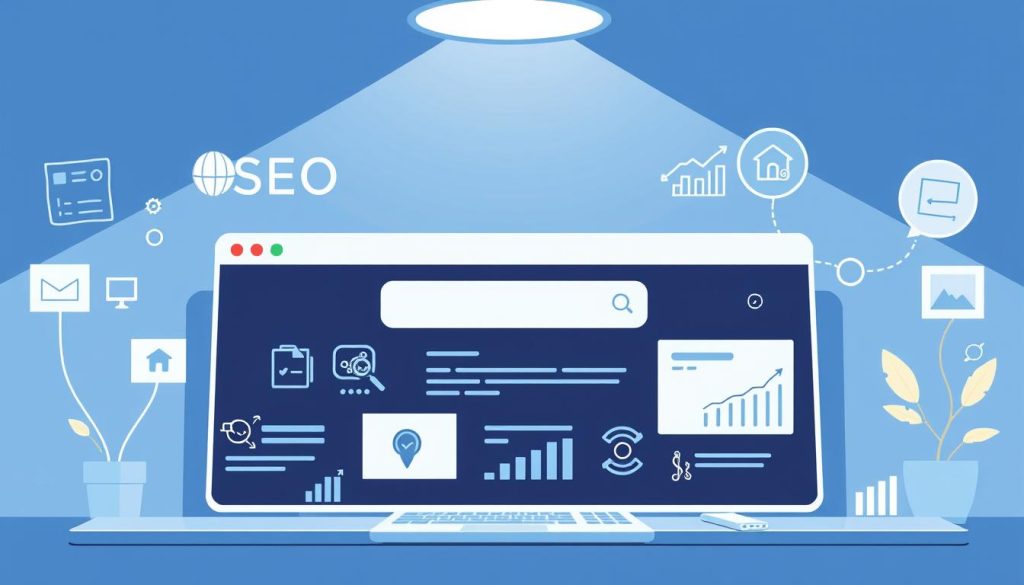Do you know a reason why on-page SEO is important? Search engine optimization is key for online success. As we move into 2025, it’s important to know how to make your website better for search engines. This helps you get higher rankings.
On-page SEO is a big part of digital success. It makes your site more visible and better for users. By tweaking your website, you can make it perform better on search engines.
Search engines keep getting better, so it’s important to keep up with the latest SEO ranking factors. This article will show why on-page SEO is so important for your digital plan in 2025.
Table of Contents
Main Objectives
- Understanding the evolution of on-page SEO
- Recognizing its importance for digital success
- Learning how to optimize your website for better rankings
- Staying updated with the latest SEO ranking factors
- Enhancing user experience through on-page SEO
Understanding On-Page SEO in 2025
The world of on-page SEO is always changing. In 2025, it will change even more. Search engines are getting better at what they do. So, we need to change how we make web pages better.
Definition and Core Components of On-Page SEO
On-page SEO makes web pages better for search engines. It includes things like title tags and meta descriptions. It also includes making content better.
Technical vs. Content Elements
Technical SEO makes a website easy for search engines to find. Content optimization makes sure the content is good and meets what people want.
How On-Page SEO Has Evolved for 2025
Search engine algorithms have changed a lot. Now, in 2025, they focus on user experience and content relevance.
Key Changes in Search Engine Algorithms
Websites that are easy to use and fast are now preferred. Search engines like content that is detailed and up-to-date.
Reason 1: Improved Search Engine Visibility
In today’s world of search engine optimization, getting better rankings is key. Websites need to make their on-page elements better. This is because search engines use smart algorithms to find and list content.
How Modern Search Engines Crawl and Index Content
Search engines like Google have complex systems to find and list web content. Structured data is very important. It gives search engines more information about the content.
Structured Data and Rich Results
Using structured data can help websites get rich results. This makes them stand out more in search engine results pages (SERPs).
On-Page Factors That Enhance Visibility in 2025
There are several things that can make a website more visible. These include:
- Title Tags: They should clearly tell what the page is about.
- Meta Descriptions: They should give a good summary of the page’s content.
- Heading Optimization: Using headings to organize the content.
Title Tags, Meta Descriptions, and Heading Optimization
Improving these areas helps with search engine visibility. It also makes the content easier for users to understand and find.
Reason2: Enhanced User Experience and Engagement
User experience is key in SEO. It affects how users engage and how search engines rank your site. A site that’s easy to use and fun can boost sales and keep users coming back.
The Direct Connection Between UX and SEO Rankings
User experience (UX) is closely tied to SEO rankings. Search engines like Google favor sites that are easy for users. Engagement metrics like time on site and bounce rate show how good your UX is.
Measuring and Improving Engagement Metrics
To better engagement, you need to track it well. Google Analytics can show how users interact with your site. To improve, work on your content layout, make pages load faster, and make navigation simple.
On-Page Elements That Improve User Experience
Several on-page elements can make your site better for users. These include intuitive navigation, internal linking, and clear content layout. A well-organized site helps users find what they need fast.
Navigation, Internal Linking, and Content Layout
| Element | Description | Benefit |
|---|---|---|
| Intuitive Navigation | Easy-to-use menus and clear categorization | Helps users find information quickly |
| Internal Linking | Links to other relevant pages on the site | Enhances user engagement and reduces bounce rates |
| Content Layout | Clear and readable content formatting | Improves readability and user satisfaction |
Reason3: Why On-Page SEO Is Important for Mobile Optimization
Mobile devices are now the main way people use the internet. This makes having a website that works well on phones very important. It’s not just nice to have; it’s a must.
Mobile-First Indexing Standards in 2025
In 2025, how search engines rank websites will focus more on mobile versions. This means your website’s mobile version is key for being seen in search results. It’s vital to make sure your site works well on phones.
Responsive Design Requirements
A responsive design makes websites work well on all devices. It makes sure content looks good and is easy to read on any screen. Responsive design is not just about looks; it’s about how well it works.
Implementing Mobile-Friendly On-Page Techniques
To make your website better for mobile, you can use a few tricks. Make sure your site looks good on all devices, speed up images and content, and make everything easy to touch.
Touch-Friendly Elements and Mobile Page Speed
It’s important for websites to be easy to use on phones. This means buttons and links should be simple to tap. Also, mobile page speed is very important. People expect websites to load quickly on their phones.

By focusing on making your website better for mobile, you can improve how people see it. This can also help your site rank higher in search results.
Reason4: Faster Loading Times and Core Web Vitals
SEO in 2025 is all about page speed and core web vitals. We’ll see how on-page SEO can make pages load faster. It also meets the latest core web vitals standards.
Direct Impact of Page Speed on 2025 Rankings
Page speed is key for SEO rankings. It affects how users feel and stay on a site. Fast-loading sites are favored by search engines.
Latest Core Web Vitals Thresholds
Core web vitals include LCP, FID, and CLS. Sites need to keep LCP under 2.5 seconds. FID should be less than 100 milliseconds. CLS must be below 0.1.
Optimizing Performance Through On-Page SEO
Improving page speed is vital. On-page SEO techniques like optimizing images and minifying code help. They make sites faster and better for search engines.
Image Optimization, Code Minification, and Resource Prioritization
- Image Optimization: Compressing images without losing quality.
- Code Minification: Making CSS, JavaScript, and HTML files smaller.
- Resource Prioritization: Loading important resources first.
Reason5: Better Content Relevance and Topical Authority
Content relevance and topical authority are key in on-page SEO for 2025. Search engines now look for content that’s both relevant and authoritative on a topic.
Advanced Content Optimization Strategies for 2025
To boost content relevance, advanced strategies are needed. One key method is semantic SEO. It’s about understanding the context and intent of search queries.
Semantic SEO and Entity Relationships
Semantic SEO makes content rich in meaning. It shows how different entities are connected. For example, content about “on-page SEO” should also link to “keyword research,” “meta tags,” and “content quality.”
Building Topical Authority
To build topical authority, a detailed plan is needed. This includes making content clusters and using smart internal links.
Content Clusters and Internal Linking
Content clusters group related content together. This makes it clear to search engines what you’re about. Internal links help users move through these clusters, sharing link value and improving their experience.
| Strategy | Description | Benefit |
|---|---|---|
| Semantic SEO | Understanding context and intent behind search queries | Improved content relevance |
| Content Clusters | Grouping related content together | Enhanced topical authority |
| Internal Linking | Effective navigation and link equity distribution | Better user experience and SEO |

Reason6: Gaining Competitive Edge in Your Industry
Getting ahead in your industry with on-page SEO is more than just being good. It’s about being seen as the best by search engines. Today, businesses need smart on-page plans to stand out.
Analyzing and Surpassing Competitor On-Page Strategies
To get ahead, look at what your competitors do with on-page SEO. Check their keywords, content, and links.
Tools for Competitive On-Page Analysis
Tools like Ahrefs, SEMrush, and Moz help a lot. They show what your rivals do well and what they don’t, helping you improve.
Implementing Advanced On-Page Techniques
After studying your competitors, it’s time to use advanced on-page methods. This means optimizing for featured snippets and other SERP features.
Featured Snippet Optimization and SERP Feature Targeting
Featured snippets can really help you be seen more. Make sure your content is short, clear, and answers questions. Also, aim for other SERP features like knowledge panels and local packs to boost your online look.
| On-Page Technique | Description | Benefit |
|---|---|---|
| Keyword Optimization | Using relevant keywords in content and meta tags | Improved search engine rankings |
| Featured Snippet Optimization | Creating content that answers user queries concisely | Increased visibility in search results |
| SERP Feature Targeting | Optimizing for knowledge panels, local packs, etc. | Enhanced online presence |
Reason7: Adaptation to AI and Voice Search Optimization
To stay ahead in 2025, it’s vital to understand how AI-driven search and voice search optimization impact on-page SEO. Search engines are getting smarter, using natural language processing (NLP) to give better results.
AI-Driven Search Algorithms in 2025
AI-driven search algorithms are changing how search engines work. They now focus on what you really mean when you search. This makes NLP and content quality key for SEO.
Natural Language Processing and Content Quality
NLP helps search engines understand human language better. To optimize for NLP, make your content engaging and answer what users are looking for.
Optimizing On-Page Elements for Voice Search Queries
Voice search is getting more popular. So, it’s important to make your on-page elements work for conversational queries. Use conversational keywords and create question-based content that answers user questions.
Conversational Keywords and Question-Based Content
To get better at voice search, find out what questions your content answers. Use conversational keywords naturally. Here’s a table to help plan your content:
| Content Type | Conversational Keywords | Question-Based Content |
|---|---|---|
| Blog Posts | Long-tail keywords, phrases | FAQs, how-to guides |
| Product Descriptions | Product features, benefits | Product reviews, comparisons |
| Landing Pages | Service descriptions, value propositions | Service FAQs, testimonials |
Conclusion: Implementing Effective On-Page SEO in 2025
On-page SEO is key for success online in 2025. It makes your website better for search engines and users. This helps get more people to visit your site.
By using on-page SEO, companies can boost their online image. They can also make their website better and stay ahead in digital marketing.
To succeed, keep up with new trends in on-page SEO. This includes mobile-first indexing, core web vitals, and voice search. This way, your site stays visible and competitive.



